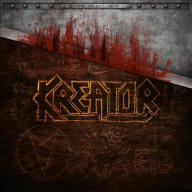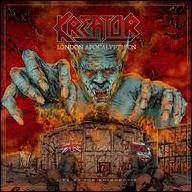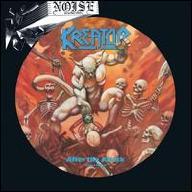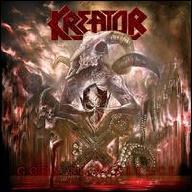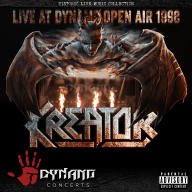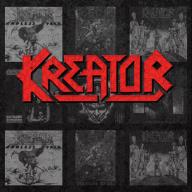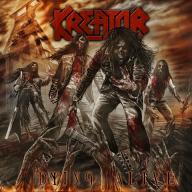Originally named Tyrant and then Tormentor, Kreator were founded in 1982 by vocalist/guitarist Mille Petrozza, bassist Rob Fioretti, and drummer Jürgen Reil (aka Ventor) in the industrial capital of Essen, Germany. They were still known as Tormentor when their first two demo tapes, one fittingly named Blitzkrieg (1983), and the other End of the World (1984), fell into the hands of thousands of heavy metal fans engaging in the era's bustling underground tape-trading network. Positive word of mouth soon attracted the attention of Germany's own metal start-up, Noise Records, which signed the newly re-christened Kreator to a deal and immediately put them to work on their first album. Recorded in just ten days at Berlin's Musiclab Studios, 1985's Endless Pain was a savage debut, but its crude thrashing quickly had the underground metal world abuzz with excitement. A second guitar player, Wulf, was hired for touring purposes, and with Kreator's reputation preceding them, lucky fans within the band's modest touring radius were soon clamoring for tickets.
No sooner had they come off the road than Kreator were heading right back to Musiclab Studios, this time with producer Harris Johns (Helloween, Voivod) to record their second album, Pleasure to Kill. Unleashed in 1986 and still considered the band's first "classic" album, Pleasure to Kill raised the bar with more diversity of tempos and greater attention to technical execution while losing nothing in terms of ferocity or speed. The band closed out the year with the Flag of Hate EP (named after a re-recorded version of their earliest hit), and there seemed to be little doubt that Kreator, along with fellow Germans Helloween and Switzerland's Celtic Frost (with whom they toured the U.K. a year later), were fast becoming Europe's top extreme metal contenders. Recorded at Hanover's Horus Studios with English producer Roy Rowland, 1987's Terrible Certainty did nothing to dent this perception, since, for once, Petrozza and company actually had a little time to work out the songs beforehand. The ensuing tour further established their reputation as dedicated road warriors and saw Kreator beefed up to a quartet once again with the addition of guitarist Jörge Trebziatowski. Profits from these concerts would help finance yet another EP (product being something Noise never stopped asking for) titled Out of the Dark, Into the Light, released in August 1988.
By this time, all signs suggested that Kreator were on the verge of a major breakthrough, and when Noise struck a deal with giant Epic Records for large-scale distribution in America, Petrozza knew this was his chance of taking his band global. Mustering all of his creative juices and honing his songwriting, he led Kreator into Los Angeles' Music Grinder Studios and brought in well-regarded producer Randy Burns (Megadeth, Nuclear Assault, etc.) to guide them to another thrash metal landmark with 1989's Extreme Aggression. With videos made for the ubiquitous title track and the venomous "Betrayer" getting plenty of exposure on MTV's Headbangers Ball, Extreme Aggression quickly became their biggest seller yet, and the subsequent North American swing with Suicidal Tendencies introduced the band to many new friends. The tour also marked the debut of former Sodom guitarist Frank Blackfire Gosdzik, whose nightly lead guitar duels with Petrozza are still the stuff of fond memories for Kreator fans. Seeking to capitalize on the group's momentum, Noise rushed them back into the studio to whip up their next effort, Coma of Souls, released in October 1990. Unfortunately, the hastily conceived LP clearly suffered from the less than favorable circumstances in which it was created, seeming too much like a retread of earlier material and bogged down by filler. It should also be noted that, by the end of the '80s, thrash and speed metal had largely run their course and mutated into death metal, leaving genre standard-bearers like Kreator, Anthrax, and even Metallica with a difficult choice: evolve or perish.
Released in 1992, the appropriately named Renewal seemed to answer that question by going straight to the source for help. Kreator sought out renowned producer Tom Morris (Sepultura, Morbid Angel, etc.) at his Morrissound Studios in Tampa to help them delve deeper into the death metal template. (One thing that needed no updating was Petrozza's hissing, scratchy voice, which of course, pre-dated, and no doubt influenced, death metal's Cookie Monster vocal style.) Proving just how wary (perhaps too wary) the studio was of current trends, Renewal also came slathered in industrial-metal techniques -- something that did not go over well with Kreator and was later blamed for the album's disappointing showing. The excruciatingly taxing tour commitments that followed took the band as far as South America, but understandably left them physically and creatively exhausted, prompting Petrozza to announce a protracted break to recover. Incredibly, Kreator's silence was only broken three years later with the release of 1995's somewhat back to basics Cause for Conflict -- their first effort for new label GUN Records. Hardly a successful comeback, the album found Kreator confused and uninspired -- hopelessly out of touch with the day's reigning extreme metal trends, and surely traumatized by the recent departure of both Fioretti and Ventor (they were replaced by bassist Christian Giesler and former Whiplash drummer Joe Cangelosi). Adding insult to injury, Noise Records chose exactly this difficult moment to release the Scenarios of Violence set -- a collection of live recordings and remixed old hits that seemed to declare Kreator's future prospects null and void.
Looking to remedy the band's tenuous situation, Petrozza called upon former Coroner guitar wizard Tommy Vetterli to help him guide Kreator into realms unknown, getting even further away from their roots on their next two albums, the highly experimental Outcast (1997) and Endorama (1999). Both of these veered into ever-slower pacing, added gothic and ambient elements, incorporated samples and loops, and even found Petrozza trying a few different singing styles on for size. But even though they met with certain critical acclaim and signaled Ventor's welcome return to Kreator's ranks, neither of these albums managed to re-ignite the band's career. Yet again, timely retrospective releases like 1999's Voices of Transgression (shedding light on the band's hit-and-miss second decade) and 2000's Past Life Trauma (a near-flawless wrap-up of their first decade) provided some consolation for disgruntled old fans who had long abandoned Kreator's floundering ship, but, unexpectedly, they also cleared the way for a rebirth of sorts.
This renaissance began to take shape following Vetterli's departure and the signing of a new record deal with Germany's SPV label. Simply put, Petrozza recommitted himself to thrash, and, after hiring Finnish-born second guitarist Sami Yli-Sirnio, proceeded to write Kreator's strongest album in years, with 2001's positively stunning Violent Revolution. In keeping with Kreator tradition, the consequent world tour became their most comprehensive and extensive to date. Thanks to Violent Revolution's great success, it served to reintroduce and reestablish Kreator as one of the world's premiere speed metal acts -- a feat that was commemorated with the group's first live album -- a lavish two-CD/DVD set appositely named (with some grammatical license) Live Kreation/Revisioned Glory -- a couple of years later. The band returned in 2005 with the similarly themed Enemy of God, followed by At the Pulse of Kapitulation: Live in East Berlin, 1990 in 2008 and the reliably thrash-heavy Hordes of Chaos in 2009.
In 2010 the band signed to leading German metal stable Nuclear Blast before embarking on a 25th anniversary tour of North America, which was followed in short order by the European Thrashfest tour with contemporaries such as Death Angel and Exodus. Their first album for their new label was 2012's Phantom Antichrist, which saw them in fine form and was hailed as one of their best in years; it was also a major commercial success in Germany, rising to number five on the album charts, the group's strongest showing to date in their homeland. The road-hungry band promoted the album with yet another tour, culminating in an explosive, sold-out show in their hometown of Oberhausen in front of a packed audience of die-hard fans, which was recorded and filmed for the 2013 live album and DVD Dying Alive. Like Phantom Antichrist, Dying Alive proved there was still a ready audience for Kreator, with the album hitting number nine on the German charts. Despite this it would be a long five years before fans were treated to new material. It was finally announced in 2016 that their 14th studio album, Gods of Violence, would be released in 2017, marking the end of the longest recording gap in the band's history. A similar gap occurred in the run-up to their 15th studio album, 2022's Hate Über Alles, which was their first working with bassist Frédéric LeClercq (DragonForce). ~ Eduardo Rivadavia, Rovi


